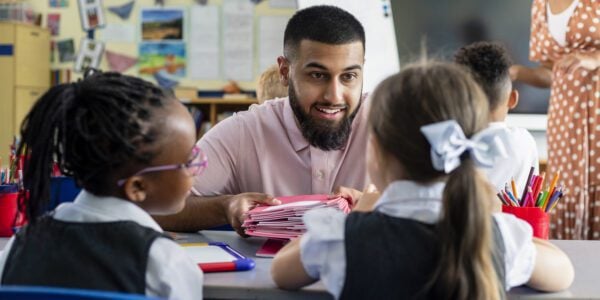
23/09/22
4 min read
Researchers and policymakers need to consider the combined impact of underfunding, COVID-19 and a declining labour force on schools.
This school year presents uniquely complex challenges for schools. Kit Malthouse MP, the newly appointed Secretary of State for Education, will need to work closely with the sector to deal with worsening financial constraints, widening attainment gaps and a diminishing workforce. With the education system under increasing strain, we are looking for research proposals that will help address the issues underlying these pressures and create an education system that will support people throughout their lives.
The Nuffield Foundation has a long history of funding research on children and young people’s pathways and skill development across all stages of education. Our work speaks to the range of interconnected challenges faced by the education system and informs recommendations for how it can be improved. We want every young person in the UK to have the best education outcomes possible, and to gain the knowledge and skills necessary to thrive in our society. In this blog, I discuss five themes emerging from the research evidence that pose important challenges for policy makers and researchers.
Low attainment
A major new review of educational inequalities in the UK from the Nuffield Foundation funded IFS Deaton Review of Inequalities highlights some startling trends. In 2016, 14% of 26-year-olds had not achieved basic GCSE level qualifications and despite rising qualification levels, England continues to stand out internationally for having almost no improvement in skills across generations.
Disadvantaged children are at particular risk of low attainment. Only 47% of 11-years-olds eligible for free school meals met the expected standard in reading, writing and maths in 2019. Attainment disparities start in early childhood and persist throughout the school years – among children who were underperforming in reading, writing and maths at the end of primary school, only 8% achieved pass grades in GCSE English and Maths.
The COVID-19 pandemic has also hindered efforts to raise attainment and address educational inequalities. Provisional figures on student attainment show that reading attainment for 11-year-olds in 2022 remained close to pre-pandemic levels but attainment in maths and writing fell. It is clear that more work is needed to restore prior levels of student attainment, let alone reach the Schools White Paper ambition of having 90% of children meet the expected standard in reading, writing and maths by age 11.
Insufficient funding
Investment in education is a necessary starting point for delivering high-quality education. Spending on education, however, has fallen over the last decade. Even less funding is now directed to supporting disadvantaged pupils, which is likely to prevent schools delivering the government’s attainment target for 11-year-olds.
This is compounded by rampant inflation, with the IFS predicting that school costs will grow by 6% in 2022-2023. Although the IFS expect schools to just about absorb this cost increase in 2022-23, schools are then anticipated to face real-term cuts.
Poor staff recruitment and retention
Most school funding is spent on staffing, and the recent teacher pay award is both too much for schools to afford and too little for teachers. Teacher salaries have lost competitiveness. Salaries for most teachers in 2022 are around 12% lower in real terms compared to 2010.
Unsurprisingly, Nuffield Foundation funded research from the NFER concludes that teacher retention rates, which improved during the pandemic, have worsened again – and applications to initial teacher training have fallen.
Worsening child well-being
In addition to the challenges that the cost of living crisis presents to school budgets, there are tangible effects on families and children. Economic hardship is likely to have direct implications for children’s development, parents’ mental health and relationships between parents. The impacts of the cost of living crisis also spill over into school. Hunger, exacerbated by the rise of food insecurity and limited access to free school meals, makes concentration, decision-making and behaviour regulation more difficult for children. Research we’ve funded from the ISER and NFER show that schools have been feeling the effects of a rise in emotional and behavioural difficulties and an increase in the number of pupils with mental health issues following the pandemic.
Children in adverse circumstances often need multi-agency support. However, capacity constraints abound. When other parts of the State become overwhelmed, schools become a provider of last resort, despite a lack of training to deliver these services. This puts school staff under strain. Children miss out on the expert support they need and schools are distracted from their core educational function.
Strained SEND system
The increase in the number of children with special educational needs and disabilities (SEND) in 2022 puts further pressure on an already strained system, which was worsened by the pandemic. As noted by the SEND Green paper, navigating the system is not a positive experience for most children. Outcomes for children with SEND are consistently worse than their peers and despite considerable investment, the system is not financially sustainable.
Worryingly, Nuffield Foundation funded research from the Education Policy Institute found a postcode lottery in access to SEND support. The Local Government Association also found an increase in the number of appeals with a staggering 9 in 10 decisions being overturned.
The policy response
The challenges facing schools are considerable. It is not yet clear what the new Education Secretary’s priorities will be, but evidence shows that the expansion of grammar schools proposed by the new Prime Minister is not the answer.
We are living in a time of unprecedented public spending pressures so tough decisions will need to be made about where and how to invest in education. Education inequalities can lead to lifelong health and income inequalities. If the issues facing education are not addressed, it will profoundly affect a generation of children and the future economy.
Apply for research funding
We invite applications that will enhance understandings of the challenges facing the education system and how these might be tackled through policy. Successful applications need to demonstrate methodological rigor and a route to impact on policy and practice.
If you have an idea that responds to these interests, please submit an outline application to our Research, Development and Analysis Fund for consideration. Our next deadline is March 2023.


















































